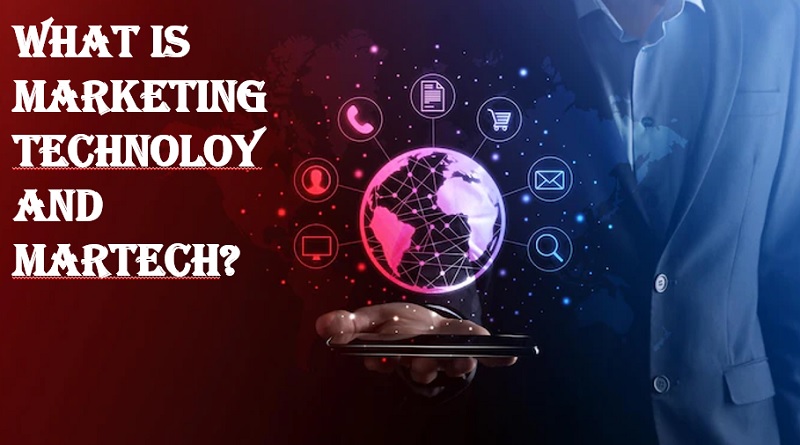Reinventing Web Design: Grapes Studio Lets Small Businesses Build Sites in Minutes
What is Marketing Technology and Martech?

MarTech has become a standard part of our vocabulary. In fact, according to Google, it is searched more than 10,000 times per month in the United States alone. But when it comes to MarTech and Marketing Technology, the terms can mean a lot. Let’s take a look at what MarTech really means, why it matters, and the challenges today’s marketers face.
What is Marketing Technology (MarTech)? Marketing technology, also known as MarTech, describes a range of software and tools that help achieve marketing goals or objectives. When a marketing team uses a marketing technology team, it is called their marketing technology stack. MarTech has become a staple of digital marketing campaigns, but can also be used to optimize marketing efforts across any marketing channel.
Difference between MarTech and AdTech
MarTech can sometimes be confused with Adtech. The difference between these programs is similar to the difference between marketing and advertising. While Martech refers to technology that helps create, communicate, and distribute offers, adtech is strictly used to influence buyer behavior by advertising offers. For example, customer relationship management (CRM) software is martech, while social advertising platforms are adtech.
The importance of marketing technology
In 2012, Gartner predicted that by 2017, CMOs would spend more money on technology than CIOs. While this claim was controversial at first, the spending gap between these parties has narrowed dramatically over the years. Indeed, technology is playing an increasingly important role in marketing, especially in supporting efforts such as marketing spend allocation and allocation.
With the ever-changing Martech landscape, marketers can be overwhelmed with which to choose. For this reason, marketers need to be sure that they are investing in marketing technology solutions that will facilitate greater growth for their organization.
Basic marketing technology
The best tech marketers can invest in depends heavily on the audience they’re marketing to. For example, does your organization market products to other businesses (B2B) or to consumers (B2C)? While your organization’s market has a huge influence on which martech will be most effective, all marketers should consider implementing the following technologies:
Marketing attribution software
As John Wanamaker (1838-1922), a famous American businessman, put it: “Half of the money I spend on advertising is wasted; the problem is I don’t know which half. More than a century later, this dilemma remains unsolved for many businesses. Outdated attribution models or not taking into account online and offline success cause companies to miss opportunities. Partnering with the right marketing attribution software can help with this.
Advertising via e-mail
In his book, The Longtime Seller, Ryan Holiday discusses the importance of email and nurturing those relationships face-to-face with customers. Since email is not subject to algorithmic changes or trends, it is one of the best platforms to reach your target audience. Consider this:
In a recent survey, more than 50% of US respondents admitted to checking their email more than 10 times a day. Email is an effective way for brands to reach customers. Content Management System
This technology is capable of powering both your website and blog. With 88% of consumers researching products online before buying them, investing in a quality website is essential. Your website is the backbone of the rest of your digital strategy, as marketing and advertising clients drive consumers there.
customer experience software
This part of the marketing technology stack should focus on improving your customers’ interactions with your brand, whether it’s testing which messages work best or personalizing their experience. This includes software related to A/B testing.
customer relationship management software
This is more common for B2B companies focused on lead generation, but these platforms can help your business manage leads. CRM can determine the position of the lead in the funnel and evaluate the opportunity level
Predictive marketing technology
Over time, marketing technology will continue to evolve and become more important in modern marketing campaigns. However, martech will have to adapt to the changing marketing environment. Here are some trends that marketers should be aware of before investing in martech:
Reduce marketing budgets – Gartner now predicts that budgets are stabilizing for marketing departments. This will force businesses to demonstrate a return on their investment and marketing spending.
Focus on Retention – It costs 5 times more to attract a new customer than to keep an existing one. Marketers will begin to focus not only on acquiring new customers but also on developing customer relationships.
Importance of Understanding Marketing Spend – According to Gartner’s 2018 Marketing Technology Survey, only 18% of marketers understood multi-touch attribution (MTA) in 2016. By 2018, that number had grown to 52%, with respondents noting that they use MTAs to measure ad effectiveness. However, the MTA is limited to proving online value only. As marketers are under constant pressure to demonstrate ROI across all channels, marketers will need to adopt a unified marketing metric.
More Innovation – There is an interesting dichotomy between established enterprise software companies investing in cloud-based solutions and emerging startups. This increase in competition will lead to more innovation in marketing. In addition, with the emergence of IoT and the continued growth of AI marketing, marketing technology companies will be able to provide their customers with more powerful solutions to help marketers speak. Talk directly to their audience and establish a return on investment.
Marketing Technology Challenges
Deploying, maintaining, and optimizing your organization’s martech technology is not a simple, logical process. Instead, organizations must prepare to overcome a number of key challenges before they can fully realize the benefits of marketing technology.
Choose the right MarTech platform
Choosing the right platform is difficult because choosing one is more than just finding the right technology – it’s all about finding the right partner. Integrating a new system is often a challenge, and working with internal and external stakeholders to implement the technology can create unexpected obstacles.
Changing corporate culture
For many organizations, changing the way marketing works can be a daunting task. Working with colleagues to train them on new platforms and workflows is a barrier to day-to-day operations. As Peter Drucker said, “Eat culture strategically for breakfast.” Unfortunately, changing corporate culture to use martech can often be a big hurdle for businesses.
Processing too much data
There is a lot of data in today’s marketing environment. Encrypting data to determine what’s important and what’s not can be a daunting challenge for your organization. Choosing the right vendor and working with data scientists to help analyze large amounts of data can help steer your marketing department in the right direction.
The importance of agility
The main goal of any marketing technology plan is to be flexible. An agile methodology that leverages the project management process that combines engineering best practices with business development and uses continuous communication and adaptation. Agility allows marketers to be more flexible, with more frequent and shorter action cycles. While flexibility is often associated with product development, applying that same mindset to marketing can yield tremendous results, especially when rolling out products to members. internally within your team. 93% of CMOs using an agile strategy say it has helped them bring ideas, campaigns and products to market faster.




